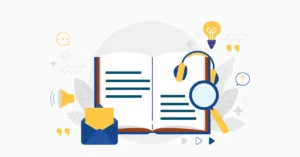
IGCSE English as a Second Language: Listening, Writing, and Speaking
Preparing for your IGCSE English as a Second Language (ESL) exam can feel daunting. You are not just learning grammar
Learn how to write step-by-step answers, and score A* in your exam!

Announcement: Cambridge IGCSE, O Level and AS & A Level June 2025 past papers are now available.
A summary is a shortened version of a passage containing the key points in as few words as necessary. The summary exercise requires the ability to identify the main ideas, express them in one’s own words, and arrange them in a logical sequence, all while adhering to a word limit.
Content. Answer directly the question and focus on the relevant points only. Use as much material as possible; while exercising caution towards any irrelevant details. Take points directly from the passage and avoid repeating similar points, even if they were mentioned twice.
Your summary must be supported by references and directly connected to the passage. Adding facts or opinions is not suggested since this exercise is meant to summarise, not add to the original ideas. You will only obtain content marks when you provide the right content.
Language. Write your summary in your own words as far as possible. Although the message must be the same, the wording must be different. The replaced words must convey the essence of the point. Only change the words when appropriate. Therefore, there is no need to find synonyms for technical objects, e.g., solar heaters.
Lifting a few words is acceptable if it shows evidence of understanding and focuses on key details. But avoid over-lengthy lifting and quoting straight from the passage. Find precise words to use and vary your choices.
Writing Style. Express the key points clearly, succinctly, and fluently using an impersonal and formal writing tone. Connect your ideas into a paragraph to organise and sequence points cohesively. Try to use complex sentences instead of simple or compound structures, and ensure that you use correct spelling, punctuation, and grammar.
Avoid any introductions and conclusions, and instead, begin your summary with the exact wording of the question. Then, do not include examples, repetition, direct speech, figurative language, and minor details in your summary. Lastly, ensure that your ending is strong and impactful.
Word Limit. Always write your summary within the word count, as this exercise assesses the ability to write concisely. There are no penalty marks for writing more or less. However, it may be self-penalising to write more than suggested. Going over the word limit implies poor structure or unclear ideas. On the other hand, writing way too less than the limit may mean the response does not have sufficient coverage. For example, if the question requires 200 to 250 words, but you only provide 180 words, there is a chance that you do not include sufficient points.
Before the exam, check how many words you write on a line; then, you’ll know approximately how many lines you will need. Lastly, do not write beyond the lines given to avoid your answers not fitting into the scanned screen.
Join 62,169 (and counting) IGCSE & AS/A Level subscribers who've taken our insanely valuable FREE email courses. Learn exam tips & score A* in your exam!
| Prefix | Meaning | Examples |
|---|---|---|
| anti- | against/opposed to | anti-government, anti-racist, anti-wat |
| auto- | self | autobiography, automobile |
| de- | reverse or change | de-classify, decontaminate, demotivate |
| dis- | reverse or remove | disagree, displeasure, disqualify |
| down | reduce or lovwe | downgrade, downhearted |
| extra- | beyond | extraordinary, extraterrestial |
| hyper | extreme | hyperactive, hypertension |
| il-, im-, in-, ir- | not | illegal, impossible, insecure, irregular |
My daughter got an A*
“My daughter got an A* for her English First Language! Skolatis gave her the confidence she needed.”
~ Carrie (Malaysia)
In 2024, Cambridge IGCSE removed the summary task from its English as a Second Language Reading and Writing paper.
Find out in our A* Model Answers. Copy the style and score A*!
Come join our A* revision courses that are designed based on proven A* scoring system, move up your level and reach your A*!
* Note: Some relevant info taken from CIE.
Join 62,169 (and counting) IGCSE & AS/A Level subscribers who’ve taken our insanely valuable FREE email courses. Learn exam tips & score A* in your exam!
Hazim
Hazim
Somya Damania
India
Somya Damania
India
Juan Felipe
Juan Felipe
Yaar Yot
Yaar Yot
Rebecca John
Rebecca John
Vishal Varadraj
Vishal Varadraj
Cynthia
Cynthia
Naomi Barguirdjian
South Africa
Naomi Barguirdjian
South Africa
Ahmad Kadiri
South Africa
Ahmad Kadiri
South Africa
Omayma Muhammad
Saudi Arabia
Omayma Muhammad
Saudi Arabia

Preparing for your IGCSE English as a Second Language (ESL) exam can feel daunting. You are not just learning grammar

Choosing the right educational pathway for your child is one of the most significant decisions a family can make. In

The IGCSE English First Language exam places a strong emphasis on creative writing, with writing descriptive and narrative essays being

In the IGCSE English First Language Directed Writing task, you’ll be required to either write a speech, letter, or article
89 responses
Please guide me on the language that should be used in the summary…..it is really diffficult for me.
Hello Ali,
You must always use your own words when writing Summary. The points must be taken from the passage, but change them to your own words. Furthermore, upon checking the Examiner’s Report, it states that the examiners are looking to credit candidates who can convey the relevant content points with some style rather than in the form of a list. As such, it is best to write a cohesive piece of writing, with ideas presented in a logical sequence. You may write your answer in one or two paragraph for summary.
You may be interested in our exam model answers. Our model answers will show you what is an A* answer is like for the writing questions/exercises: https://www.skolatis.com/igcse-exam-resources/
We also offer A* online revision course. These had helped numerous students to score A*. The revision course provides video tutorial, revision timetable, downloadable exam-style practices, common mistakes candidates make during the exams, and also examiners’ advice. For English subjects, there is a writing practice after each topic and you may submit your writing for marking. Please kindly find out the details here: https://www.skolatis.com/cambridge-igcse-revision-courses/.
You may want to subscribe to our newsletter where we send out valuable FREE email courses. You will learn exam techniques & it will help you score A* in your exam.
Hello..
I am doing my English as a second language external exam on May/June 2020..
however, writing in a complex structure is really a tough task for me..
I would like to know if there where some tips for making it easier ,and to improve my English language and writing skills?.
I would also like to request the proper layout (for example ,should we skip or not a line,or do we leave a space before writing) when writing a summary as i always mess it.
moreover ..I recently signed in ,and honestly found the website really helpful..
thanks a lot for your efforts
Hello Nouran,
You are very much welcome. We are glad to help.
The most important things you need to do are: read a lot and write a lot. We can’t stress enough of “read a lot”. By reading, you will gain tremendous knowledge on how to phrase your sentences, types of vocabulary, style, etc… Besides reading, you ought to practise writing as well. You have to put to use what you have learnt. Kindly read this article to help you with your writing: https://www.skolatis.com/9-powerful-tips-to-score-in-writing/.
Furthermore, it is ideal to leave spaces in between your answer so that the examiners can read your answers clearly. You may be interested in our exam model answers. Our model answers will show you what is an A* answer is like for the writing questions/exercises: https://www.skolatis.com/igcse-exam-resources/.
We also offer A* online revision course. These had helped numerous students to score A*. The revision course provides video tutorial, revision timetable, downloadable exam-style practices, common mistakes candidates make during the exams, and also examiners’ advice. For English subjects, there is a writing practice after each topic and you may submit your writing for marking. Please kindly find out the details here: https://www.skolatis.com/cambridge-igcse-revision-courses/.
You may want to subscribe to our newsletter where we send out valuable FREE email courses. You will learn exam techniques & it will help you score A* in your exam.
I am losing marks in summary what shall I do
Hi Kanav,
The important point in writing a Summary is to not go beyond the word limit. You must always use your own words when writing Summary. The points must be taken from the passage, but change them to your own words.
Furthermore, upon checking the Examiner’s Report, it states that the examiners are looking to credit candidates who can convey the relevant content points with some style rather than in the form of a list. As such, it is best to write a cohesive piece of writing, with ideas presented in a logical sequence. You may write your answer in one or two paragraph for summary.
You may be interested to purchase our exam model answers. Our model answers will show you what is an A* answer like for the writing questions/exercises:
https://www.skolatis.com/igcse-exam-resources/
it is a really good site and i love studying on this site it helps me relate to the topic..
Hello there,
Thank you for appreciating our effort. Do not hesitate to leave us a comment if you have further questions.
How many points shall I have in my summary?
Hi Marwan,
The number of marks is usually a clue to how many different points are needed. For example, if the content has four marks allocated to it, you must provide four relevant points. Be reminded that the points must be taken from the passage and do not repeat similar points even if it was made twice.
Kindly read this article for more tips: https://www.skolatis.com/how-to-write-a-summary/